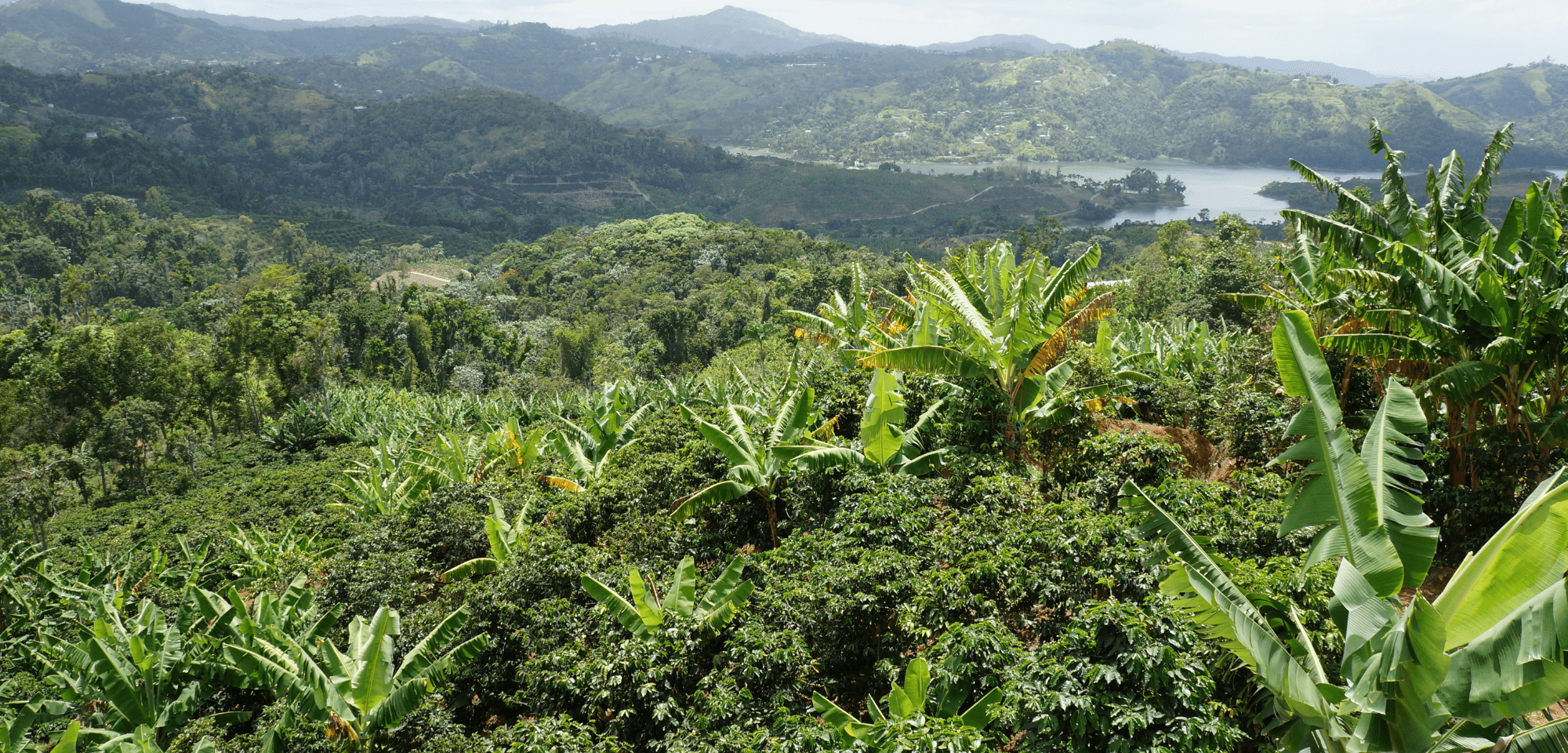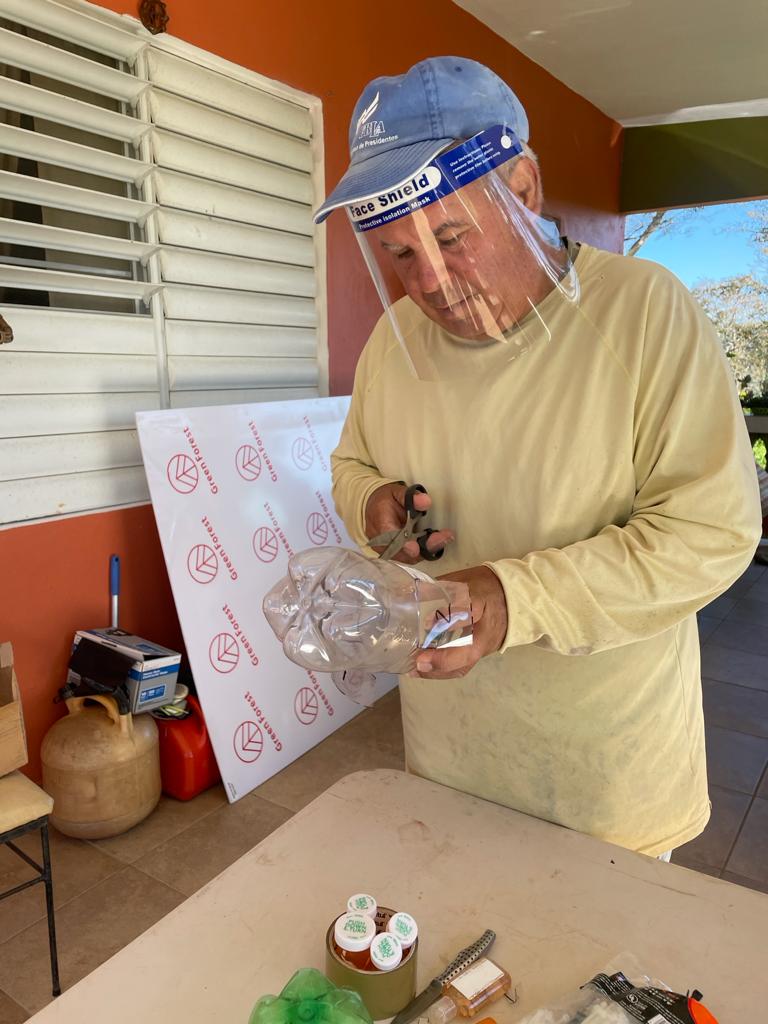Building Climate Resilience in Puerto Rican Coffee Communities
After Hurricane Maria in 2017, Puerto Rico lost an estimated 80% of its coffee trees, crippling an entire industry and leaving many coffee farmers reeling. Today, TechnoServe is working to revive the industry by helping thousands of smallholder coffee farmers significantly increase their yields and boost their resilience to future threats.
Step onto Finca El Remanso, tucked high in the mountains of southwestern Puerto Rico, and you’ll feel transported into another world. On sunny days, verdant hills give way to endless blue skies, and the farm boasts unparalleled views of the island.
The owners of the farm, Elisa Alicea Sanchez and Javier Hernandez Velez, have grown coffee here for over a decade. Today, coffee trees line the hillsides in neat rows and flourish under their careful management. But this was not always the case.
The Rise and Fall of Coffee Production in Puerto Rico
Coffee has a long history in Puerto Rico, dating back to the 1700s. But in the last two decades, a changing climate and a series of devastating hurricanes, including Hurricane Maria in 2017, led to a significant decline in production. The island lost an estimated 80% of its coffee trees after Hurricane Maria, crippling an entire industry and forcing many coffee farmers to abandon their farms in search of other opportunities.
In the years since Hurricane Maria, coffee has slowly been making a comeback on the island. But the threat of increasing temperatures, erratic rainfall, and severe weather events continue to disrupt that progress.
Since 2018, TechnoServe has been working to revive the coffee industry in Puerto Rico through the Revivamos Nuestro Café program, a partnership between TechnoServe, Nespresso, Hispanic Federation, and Colibri Foundation.
Through the program, farmers like Elisa and Javier receive training on good agricultural practices, including composting, pest and disease management, and erosion control. With these improved techniques, farmers can increase their resilience to climate threats and enhance their coffee quality and yields, leading to increased incomes and improved livelihoods.

A Puerto Rican Coffee Story
Elisa and Javier’s coffee story began in 2010 when they moved from the city of Ponce to rural Yauco. Looking to retire and settle down away from the hustle and bustle of the city, they dreamed of creating an agricultural and environmental oasis where visitors could reconnect with nature and unwind. But this dream encountered several setbacks. When they first bought the property, the land had been untouched for almost 40 years.
“The grass was over seven feet tall when we arrived here,” Javier recalls. “In the beginning, we did what everyone does: use chemicals to get rid of the weeds and use heavy machinery to get rid of the dense vegetation.”
Puerto Rican coffee farming traditions are often passed down from generation to generation. As a result, many farmers are hesitant to adopt new practices that might be more costly or time-intensive, even if they have long-term environmental benefits.
Change starts with changing one’s point of view. TechnoServe is giving farmers who have been performing the same practices for years new ways of attaining greater results. Time will show the difference.”
— Elisa Alicea Sanchez, Puerto Rican coffee farmer
Improved Resilience Despite COVID-19
For Elisa and Javier, the decision to join the TechnoServe program came in December 2019 after they were browsing the internet and heard about the Revivamos Nuestro Cafe project. However, soon after joining the program, the COVID-19 pandemic forced the team to quickly transition to remote training.
While field travel was not possible, TechnoServe provided farmers with virtual technical advisory services through phone calls, WhatsApp, and bulk SMS messaging. In all, the team performed 1,063 phone calls to farmers, reached 556 farmers through WhatsApp, and contacted 211 farmers through SMS messaging. Once restrictions on movement were lifted, the team moved to on-farm individual training.
The program also successfully launched a YouTube channel in 2020 and has produced 12 videos on essential agronomy training topics and COVID-19 health and safety. As of March 2021, the videos had received over 35,000 views.
Knowledge Brings Opportunity for Puerto Rican Coffee Farmers
Soon after joining the program, Elisa and Javier got to work implementing the practices they learned on their farm. “We have learned how to make compost, how to prune our trees, and how to manage coffee pests and diseases,” Elisa says. “We [also] have our own coffee nursery thanks to TechnoServe.”
One important technique farmers learn is contour planting. In Puerto Rico, coffee is typically grown in steep mountain terrain. When there are heavy rains or other severe weather events, such as hurricanes, soil erosion is common. Contour planting — planting in horizontal rows along the side of a hill — can help reduce erosion and conserve soil nutrients.
Another important lesson farmers learn is how to combat plant diseases and pests. Coffee berry borers are small beetles that burrow into the coffee cherry and cause extensive damage, often leading to reduced yields and lowered coffee quality. The program teaches farmers how to set up simple traps made from plastic bottles to reduce pest infestations on their trees without harsh chemicals.
“Today, we don’t use any herbicides or pesticides,” Javier shares. “We work the whole farm with a machete and trimmer. It takes longer, and it is more work, but we have seen the difference in the ecosystem.”
“Even the color of the vegetation has changed,” Elisa adds. “Moisture is preserved and everything looks greener. On the climate side, developing the farm while being responsible for the environment and creating as little impact on the environment was a challenge, but a worthy one.”

Farmers are also encouraged to integrate shade trees on their farms. These trees often provide both environmental and economic benefits by reducing soil erosion, improving water and soil quality, and providing an additional source of income.
“The implementation of shade [trees] and other ornamentals is essential to the ecosystem we are creating here,” Javier says. “It makes the coffee experience beautiful, and it no longer feels like work. We now have four cuerdas [3.9 acres] with coffee, and we are looking to plant a little more in the near future so we can harvest more coffee.”
Last year, the Revivamos Nuestro Café program reached 862 farming households in Puerto Rico, and it aims to reach at least 1,500 this year.
“TechnoServe reached our farm and worked hand-in-hand with us,” Elisa says. “More than that, they added a human touch to it, treated us like family, and gave us a sense of hope. For years, farmers [in Puerto Rico] have been very negative and lost hope because of earthquakes, hurricanes, the pandemic…you name it. Some things you cannot solve with money, but with time and energy, and that is what TechnoServe brings — the human touch.”




